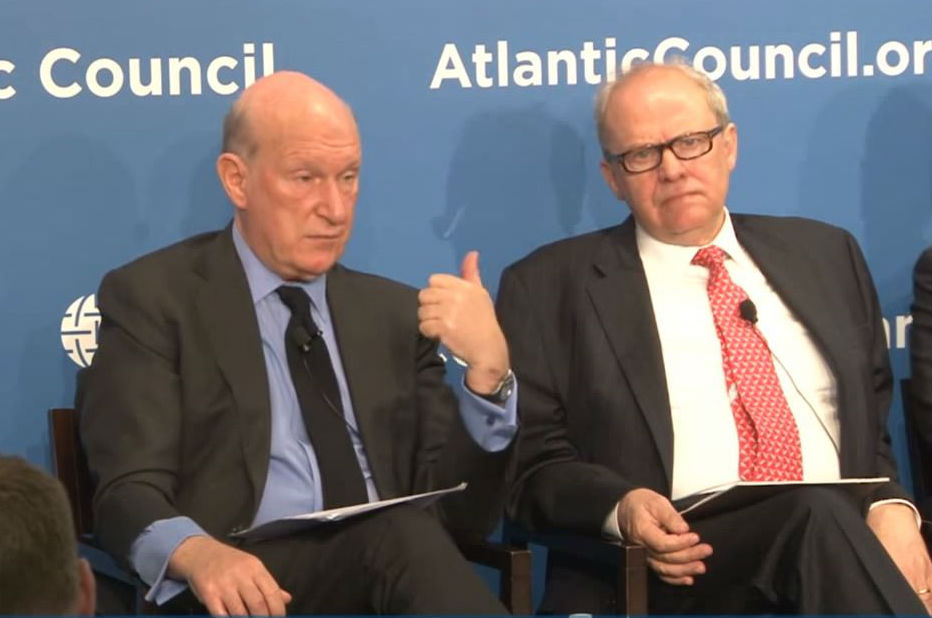 Is the Minsk process salvageable?
Is the Minsk process salvageable?
Twelve experts gathered at the Atlantic Council in Washington, DC, on March 17 to debate whether the Minsk ceasefire can deliver a sustainable peace in Ukraine. The war in Ukraine has claimed over 10,000 lives and displaced more than 1.6 million people.
The Minsk accords, signed in 2014 and 2015, have remained the guiding principles for the peace process in eastern Ukraine. According to the Minsk agreements, Ukraine must hold elections in the Donbas in line with international standards and include a constitutional provision for special status for the so-called “People’s Republics.”
In return, Russia must guarantee Ukraine’s control of its eastern border and allow international monitors full access to the occupied territories. However, the Russians have not met their basic security obligations under Minsk. Indeed, ceasefire violations are on the rise in eastern Ukraine, emanating primarily from the separatist side.
At the Atlantic Council event, which was held almost exactly two years after Russia’s annexation of Crimea, the gathered experts discussed the current state of the ceasefire.
“The situation is different from what you can see from Washington or even Kyiv,” said Deputy Foreign Minister of Ukraine Vadym Prystaiko, who just returned from a trip to the frontline. “The ceasefire is not here. Our company was shot at twice,” he said.
Johannes Regenbrecht, Special Envoy for Ukraine and Head of the Ukraine Task Force in the German Foreign Office, agreed that the ceasefire is becoming increasingly fragile. “On the political side, the process is unfortunately stalled due to political turbulence in Kyiv, and partially due to the difficult security situation in the Donbas,” he said. “There is risk of loss of political credibility…unless the political process is energized.”
View from the Occupied Territories
Paul Quinn-Judge, a senior adviser at the International Crisis Group, has visited Donetsk and Donetsk oblast at least five times and interviewed separatist leaders to understand how they view the situation and their leadership. He described the leaders there as “very scared of Minsk.”
Quinn-Judge painted a grim picture of the Donetsk People’s Republic, where a power struggle is underway. The separatists are concentrating on consolidating their own political and economic power, as well as the bulk of money-generating activities. “The major economic activity in the east…is smuggling,” he noted.
“[The separatists] are very clear that they see no chance of military victory over Ukraine without substantial and decisive large-scale Russian main force support,” Quinn-Judge explained. Meanwhile, he said, the Russians make all military decisions: they do not consult separatist counterparts, and they still believe they can pull Ukraine back from its Western choices.
Hard Choices
Anders Åslund, a senior fellow at the Atlantic Council’s Dinu Patriciu Eurasia Center, noted two very different Russian policies in the Donbas. Before October 2015, he said, the policy was “we are not there, we don’t do anything there.” In the first eighteen months of the crisis, there was minimal financing from Russia.
But things changed in October when Russian oversight of the conflict moved from the presidential administration to the Council of Ministers. Deputy Prime Minister Dmitri Kozak, who has overseen Russia’s other frozen conflicts, is now in charge of the situation in the Donbas. This management change means the whole Russian government is responsible, according to Åslund.
Moscow now has two options for the Donbas, Åslund said: give it back to Ukraine, or let it simmer as a frozen conflict. He identified three reasons why Russia might like to give up the Donbas: first, the cost; second, financial sanctions are tied to Russia’s aggression in the Donbas; third, Putin’s ultimate objective in Ukraine is to destabilize the region. “Can you imagine a more poisoned chalice than the Donbas?” Åslund asked.
But it’s hard to know how to respond, said Adrian Karatnycky, nonresident senior fellow at the Atlantic Council’s Dinu Patriciu Eurasia Center. “The Russian position constantly keeps shifting.”
Karatnycky described the “nonlinear nature of negotiations” of the Contact Group Process that brings together the French, Germans, Ukrainians, and Russians to discuss peace negotiations. Representatives from the so-called People’s Republics sit in on the negotiations. Unlike in traditional negotiations, however, paragraphs that have previously been agreed to are reopened, and the Russians use the separatists as puppets during negotiations, Karatnycky said.
“I’m a skeptic that Russia wants an agreement…Nevertheless, the Minsk process is the only game in town,” said Karatnycky.
However, not all the experts agreed with him. “It cannot be considered a real roadmap,” said Vladislav Inozemtsev, senior fellow at the Atlantic Council’s Dinu Patriciu Eurasia Center. “The separatists don’t want Minsk to be implemented. We are in a deadlock.” Inozemtsev added that he could not imagine any possible forward movement on Minsk, and urged Ukrainians to renegotiate the ceasefire agreement.
Steven Pifer, former US Ambassador to Ukraine and a senior fellow at the Brookings Institution, countered that there are “significant reasons” for the West to continue supporting the implementation of the agreement. After all, he said, “Moscow sees the Donbas not as a goal but as a mechanism” for ensuring its interests. And at the moment, a frozen conflict best suits the Kremlin’s interests.
As a result, giving up the Donbas isn’t a solution, Pifer pointed out; the Minsk negotiations must continue. “It’s the only agreement on the table,” he said. “If Minsk II collapses, I don’t see how we get to Minsk III.”
Melinda Haring is the editor of UkraineAlert at the Atlantic Council.
Image: Paul Quinn-Judge, a senior adviser at the International Crisis Group, and Anders Åslund, a senior fellow at the Atlantic Council’s Dinu Patriciu Eurasia Center, speak on a March 17 panel at the Atlantic Council.
